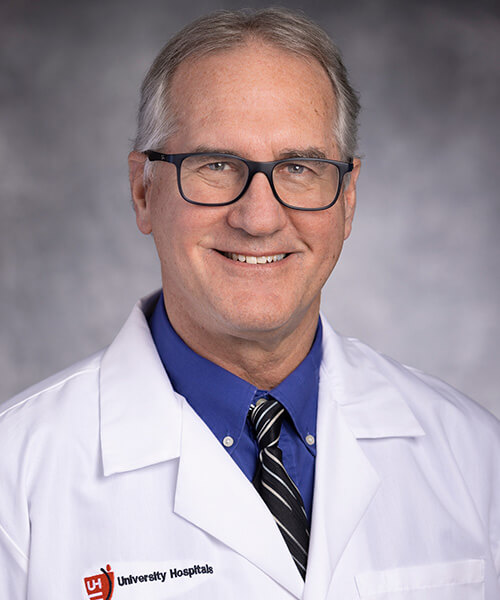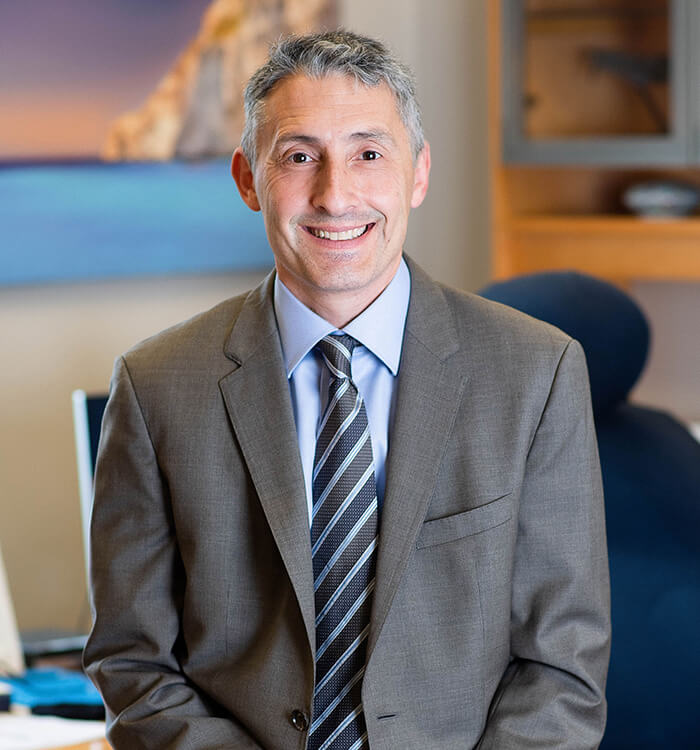A Conversation with Herbert Newton, MD, FAAN, Neuro-Oncology Medical Director, UH Brain Tumor Center
June 28, 2023
Innovations in Neurology & Neurosurgery | Summer 2023
Herbert Newton, MD, FAAN, was recently named Neuro-Oncology Medical Director of the Brain Tumor Center at University Hospitals Seidman Cancer Center. A pioneer in the study and novel treatment of brain tumors, he has dedicated 35 years to improving patients’ survival rates and quality of life. He also integrates his passion as an amateur musician and classic rock/blues bass player into his practice of medicine.
 Herbert Newton, MD
Herbert Newton, MD“Dr. Newton is a nationally recognized expert in neuro-oncology and leader in the field, and we were fortunate to recruit him to UH,” says Nicholas C. Bambakidis, MD, Chair of the Department of Neurological Surgery, Director and Vice President of the University Hospitals Neurological Institute, and the Harvey Huntington Brown Jr. Professor and Chair in Neurosurgery at Case Western Reserve University School of Medicine. “A malignant brain tumor is a challenging diagnosis requiring experienced and empathetic care. Under Dr. Newton's leadership — along with Tiffany Hodges, MD, our Interim Director of the Neuro-Oncology Center, and others — we have the ideal team in place to expand our program, increase the breadth of treatment options and advance the field through groundbreaking research.”
 Nicholas Bambakidis, MD
Nicholas Bambakidis, MDAfter graduating from SUNY Buffalo School of Medicine, Dr. Newton completed an internship in Internal Medicine within the SUNY Buffalo Health System. He also trained in Neurology at the University of Michigan Medical Center in Ann Arbor, Michigan, and completed a Neuro-Oncology Fellowship at the Memorial Sloan-Kettering Cancer Center.
Dr. Newton spent 25 years on the Neurology Faculty at The Ohio State University Medical Center and James Cancer Hospital and established the Division of Neuro-Oncology within the Department of Neurology. During his tenure, he achieved the rank of Full Professor of Neurology and was bestowed the Esther Dardinger Endowed Chair in Neuro-Oncology. After retiring in 2015, he served as Director of the Neuro-Oncology Center for the Advent Health Cancer Institute and Advent Health in Orlando, Florida.
A prolific author, Dr. Newton has published more than 220 scientific articles and book chapters and is the editor or co-editor of multiple textbooks. Since joining the faculty at University Hospitals, he has donated some of his works to University Hospitals Cleveland Medical Center’s Core Library. Included are two textbooks edited by Dr. Newton and authored by experts at major academic medical institutions in the United States, Canada, Europe and Israel.
- The Handbook of Neuro-Oncology Neuroimaging, third edition, 2022.
- The Handbook of Brain Tumor Chemotherapy, Molecular Therapeutics and Immunotherapy, second edition, 2018.
We spoke with Dr. Newton about the evolution of brain tumor treatment and how his musical interests impact his practice.
How is the Treatment of Brain Tumors Evolving? | There is much to be done to control high-grade malignant brain tumors to determine the best approach. Top of the list is trying to replicate advances with molecular therapies that we see in lung and breast cancer. No single targeted therapy seems effective against glioblastoma, but we are hopeful that a mixture of therapeutic targets might slow tumor growth.
There are also people researching immunotherapies, including pembrolizumab and nivolumab. Glioblastoma is not an immunological hotspot type of tumor, so researchers are studying alternative ways to make those drugs more effective. And some approaches combine targeted radiation with antibody therapy to attack glioma cells.
What is Your Vision for the Expansion of Neuro-Oncology at UH? Since arriving in January, I have been focused on integrating myself into the Neurosurgery and Radiation Oncology programs. Everyone has been very supportive and interested in expanding the footprint and national reach of Neuro-Oncology at UH. The plan is to have three dedicated neuro-oncologists on staff with me, and we recently hired a full-time neuro-oncology physician assistant.
I am also meeting some of the people doing basic science research here, and we are discussing applying aspects of their work to the brain tumor population. For instance, they have found a protein on the surface of glioma cells and are trying to target the protein to light up brain tumors on PET imaging. There are also researchers working on MRI fingerprinting to characterize brain tumors.
How Have Your Musical Interests Impacted Your Life and Interaction with Patients? | I grew up playing classical piano and trombone. In high school, I became interested in sports and got away from playing, but I have loved music my whole life. Later, my son started playing guitar and was getting really good. I wanted to be able to play with him, so I took bass guitar lessons and eventually started playing in a classic rock band. I am already trying to put together a band here in Cleveland, and my wife is singing with me.
I have been interested in music therapy for many years. I helped start the program at Ohio State and was involved in Florida. There is a fantastic music therapy program here at UH Seidman, and I have met all those guys. Music therapy is a wonderful modality for patients, and my brain tumor patients enjoy interacting with the therapists. Some of them participate because they want to relax. For others, it helps control their emotions so that they are in a happier state and not quite so focused on their tumor.
To refer a patient or learn more, contact Dr. Newton at Herbert.Newton@UHhospitals.org.
Contributing Experts:
Herbert Newton, MD, FAAN
Director of Neuro-Oncology
University Hospitals Neurological Institute
Medical Director of the Brain Tumor Center
University Hospitals Seidman Cancer Center
University Hospitals Cleveland Medical Center
Nicholas C. Bambakidis, MD
Vice President and Director
University Hospitals Neurological Institute
University Hospitals Cleveland Medical Center
Harvey Huntington Brown, Jr. Professor and Chair in Neurosurgery
Case Western Reserve University School of Medicine


